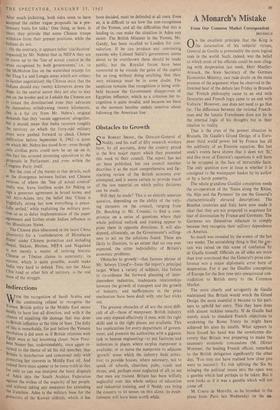Obstacles to Growth
SiR ROBERT SHONE, the Director-General of Neddy, and his staff of fifty research workers have, by all accounts, done the country proud in the first major report which they presented this week to their council. The report has not yet been published, but one council member describes it as the most comprehensive and far- reaching review of the British economy ever attempted, and it seems certain to provide much of the raw material on which policy decisions can be made.
Will they be made? This is an entirely separate question, depending on the ability of the vary- ing elements on the council, ranging from Dr. Beeching to Mr. Cousins, to find a com- promise on a series of questions where their whole political outlook and training appear to point them in opposite directions. It will also depend, ultimately, on the Government's willing- ness to act on the solutions found. These are likely to illustrate, to an extent that no one ever expected, the uttter indivisibility of Britain's economic problems.
'Obstacles to growth'—that famous phrase of Mr. Selwyn Lloyd's—form the report's principal target. When a variety of subjects, like failure to co-ordinate the forward planning of inter- dependent industries, inadequate relationships between the growth of transport and the growth of industry, and inefficiencies in the price mechanism have been dealt with, one fact sticks out.
The greatest obstacles of all are the most diffi- cult of all—those of manpower. British industry can only expand effectively if men, with the right skills and in the right places, are available. This has implications for every department of govern- ment, and presents the authorities with a gigantic task in human engineering—to put factories and industries in places where surplus manpower is available; or to move the manpower to adjacent 'growth' areas which the industry finds attrac- tive; to provide houses, where necessary, not to speak of schools, churches, pubs, roads and shops; and, perhaps most neglected of all, to see that men are trained. Britain has been wilfully neglectful over this whole subject of education and industrial training, and if Neddy can bring the country to its senses on this alone, its estab- lishment will have been worth while.


































 Previous page
Previous page